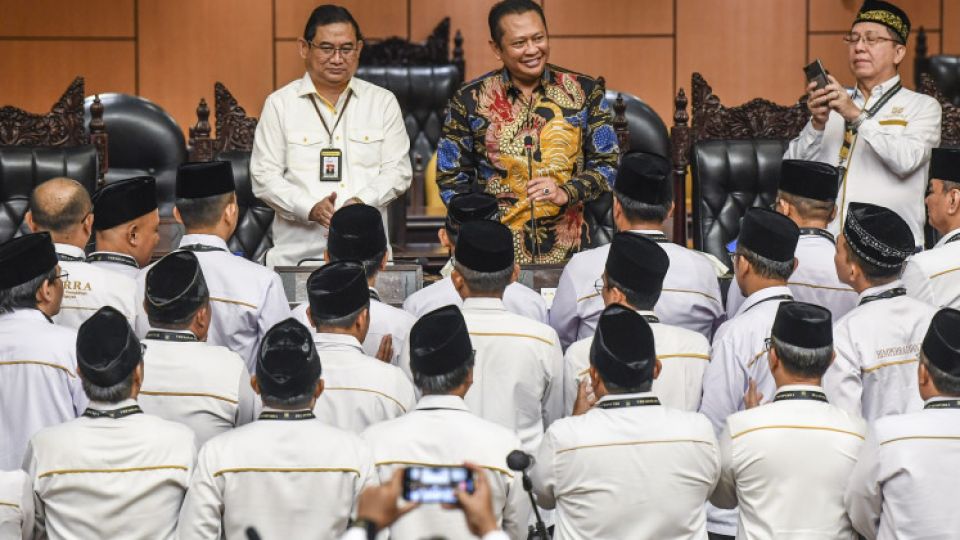June 13, 2024
JAKARTA – The latest proposal to amend the 1945 Constitution has split political parties in the House of Representatives, with some backing the idea to make the country’s foundational document more relevant to present-day challenges and others fearing an amendment could exacerbate democratic backsliding in Indonesia.
The proposal gained traction after People’s Consultative Assembly (MPR) Speaker Bambang Soesatyo, a Golkar Party politician, reportedly stated last week that all House factions would support a constitutional amendment that scrapped direct presidential elections after reflecting on the “brutal” polls in February.
The direct elections are seen by many as a hard-won victory for Indonesian democracy following decades of indirect elections during Soeharto’s New Order regime, under which the MPR had the sole authority to elect the country’s leader.
But Bambang appeared to retract his earlier statement on Saturday, after his official visit to the National Awakening Party (PKB).
“[We didn’t say] that we’ve decided to amend anything, let alone change the presidential election system. We’re only conveying various aspirations we’ve received,” Bambang told a press briefing on Saturday, saying that his statement last week had been taken out of context.
At the same press briefing however, PKB chair Muhaimin Iskandar said his faction would support a constitutional amendment, which would be the fifth if it proceeds, because doing so was the only way to fill the many “loopholes” in prevailing regulations.
“For example, when it comes to the limits of the president’s authority, no law can regulate this because the president himself [has the final say on passing a bill],” Muhaimin said.
“That’s why we need to strengthen the provisions on” presidential powers in the Constitution, he said.
The NasDem Party has also jumped on the bandwagon by declaring its support for amending the Constitution.
“But we hope that it will be preceded by thorough evaluation on the implementation of the [existing] Constitution,” NasDem executive and lawmaker Taufik Basari said on Tuesday, as quoted by Antara.
Democratic setback
On the other side of the debate are at least four parties that have put up stiff opposition against the proposal.
Among them is the Democratic Party, which argued that a constitutional amendment would be a “step back” for Indonesia’s democracy.
“If we return the authority to elect the president back to the MPR simply out of frustration at the current state of our democracy, we will just be repeating the same mistakes or end up even worse [off],” Democrats executive Kamhar Lakumhani told The Jakarta Post on Tuesday.
Eddy Soeparno of the National Mandate Party (PAN) concurred, emphasizing that democracy would be better served by thoroughly evaluating the electoral processes rather than amending the Constitution.
Indonesian Democratic Party of Struggle (PDI-P) secretary-general Hasto Kristiyanto said last week that the party would not support reversion of the electoral system, despite the flaws in this year’s presidential election.
“[Voter] intimidation shouldn’t have happened, but for the sake of ambition and power, it ended up happening. The solution to this, however, isn’t to revoke the people’s [sovereignty],” Hasto said, as quoted by Kompas.com.
The United Development Party (PPP), which is projected to hold no House seats for the next five years, was also opposed to the proposal, saying it could mark the return of an authoritarian regime, Tempo.co reported.
Meanwhile, president-elect Prabowo Subianto’s Gerindra Party is taking its time to decide on its stance.
“It is not the time to discuss such matters because we’re preparing for the upcoming regional [head] elections and the inauguration of the new president and vice president,” Gerindra executive Sufmi Dasco Ahmad said on Friday, as quoted by Antara.
The fresh call for a constitutional amendment came from Amien Rais, a former MPR speaker, who said last week that returning to indirect elections could curb vote buying, which was believed to have been rampant during the 2024 general election.
While there is credence to Amien’s statement, electoral fraud occurred not because the Constitution was weak, but because election officials and watchdogs did not do a good job, said constitutional law expert Feri Amsari.
“If we’re talking about the potential [for vote buying], the MPR could be even worse, since it has even more potential to orchestrate [a predetermined electoral outcome],” he said on Monday in a video statement.
Association for Elections and Democracy (Perludem) director Khoirunnisa Nur Agustyati said there was no urgency for a constitutional amendment, which could set back Indonesia’s democracy.
“If there is a problem in the presidential election process, there should be clear indicators of [how to resolve it],” she said, “rather than simply returning the electoral process to the MPR.”
He added that it would be impossible for MPR members to amend the Constitution in the four months they had left in office.


